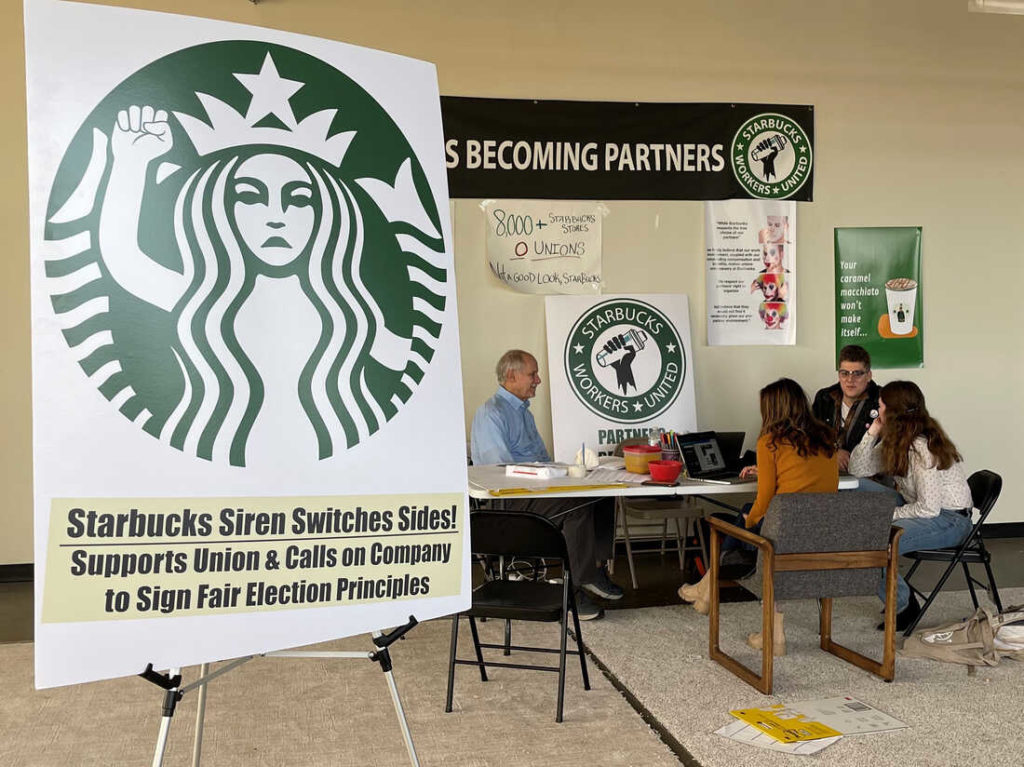Why is Organized Labor Doing So Little to Help the Current Union Surge?

I have basically given up on believing that organized labor as it currently exists can rebuild the labor movement. I don’t think it can and I don’t think most of its leaders actually care. They are worried about their own little fiefdoms, many of them (here we are not only talking about international leaders, but at the state and even the local level) are dictators who have no vision. They can talk words about solidarity, but it has little meaning in reality. They can do certain things–lobby Democrats in Congress for example. But in terms of taking the masses of unorganized who clearly are interested in unions and getting them signed up and organized? I do not think it is ever going to happen.
Steven Greenhouse and Harold Meyerson address this issue in a recent TAP piece that calls for a “coalition of the willing,” i.e., labor unions who will actually step up and provide some assistance.
BEGINNING THIS SUNDAY, the AFL-CIO will hold its first convention in five years (it was delayed for a year because of the pandemic). Barring a huge surprise, Liz Shuler, the federation’s well-liked president, will be elected to a full four-year term, after having succeeded Richard Trumka last August after he died of a heart attack. Several labor leaders told us that Shuler wants the nation’s unions to do considerably more to help today’s surge of unionization grow, but also that many unions in the federation feel little urge or compulsion to help.
As AFL-CIO president, Shuler doesn’t run the whole show. The federation works far more by consensus, with the biggest unions holding much of the power. According to labor leaders we spoke with, the three biggest unions in the AFL-CIO —the American Federation of State, County and Municipal Employees (AFSCME), the American Federation of Teachers (AFT), and the United Food and Commercial Workers (UFCW)—are saying all the right things, but haven’t yet stepped up to provide the money, lawyers, and other resources that are required to turn the current burst of unionization into a far larger, more lasting wave.
If not now, when? Not only is there a surge of youth-driven organizing in industries and companies that have not previously been organized, but Joe Biden is the most pro-union president in U.S. history, and his appointees at the National Labor Relations Board are enforcing workers’ legal protections more rigorously than they’ve been enforced during the past five decades. Moreover, millions of workers are angry about how poorly they were treated during the pandemic and are demanding better conditions at work. Today’s unusually low unemployment rate has emboldened millions more, as have the Black Lives Matter, #MeToo, and Fight for $15 movements.
This moment won’t last forever. A recession and higher unemployment may be just around the corner. Workers might soon start feeling less emboldened about sticking their necks out and unionizing.
And yet, organized labor remains mired in inertia. Most unions still do very little organizing. Last June, the Teamsters said they would launch a major effort to unionize Amazon’s warehouses, but a year later, there is little to show for it. (In fairness, the union’s new leadership has been in power for only two and a half months.) The unionization wave has been going strong for six months at Starbucks, but it hasn’t jumped to other fast-food companies like McDonald’s or Chipotle, where many workers complain of low wages. The UFCW seems to have all but given up seeking to unionize Walmart, Target, and many other major retailers.
Some unions, though, have been spending heavily on organizing. The Service Employees International Union (SEIU) underwrote the Fight for $15’s organizing efforts and has had huge success getting states to enact a $15 minimum wage, although it has failed to unionize any fast-food workers. The SEIU has also been organizing health care and airport workers, while its affiliate, Workers United, has been quietly backing the Starbucks organizing campaign with money and organizers. The Retail, Wholesale and Department Store Union organized the REI store in Manhattan and, with many challenged ballots still to be counted, hopes yet to prevail in its drive to unionize an Amazon warehouse in Bessemer, Alabama. National Nurses United has been aggressively organizing nurses in several states, and the AFT has been organizing charter schoolteachers, college faculty, and grad student workers.
But there is vastly more to be done, and it’s time for organized labor to step up.
This indifference drives everyone on the left nuts. We all want the union movement to be leaders on the broader justice issues of the day. But a lot gets in the way. A lot of these union leaders are genuinely out of touch, or more concerned about their own position of power. They talk about solidarity, but nothing backs it up. They don’t know how to organize. They also exist to serve their own members’ needs, not that of the broader working class, which everyone needs to understand.
That said, the opportunities are right there. Why SEIU is not going back into McDonald’s and organizing them one store at a time like Starbucks workers are doing, I do not know. Why the AFT and NEA is not throwing their many millions of dollars toward helping organize non-teachers, I do not know. Just because you have “teachers” in your name does not mean you can only organize teachers, as graduate students with the United Auto Workers know well. There’s just so much that can be done. And be done right now! People really want to join unions right now! This opportunity doesn’t come around every day. Take advantage of it for God’s sake!!!


